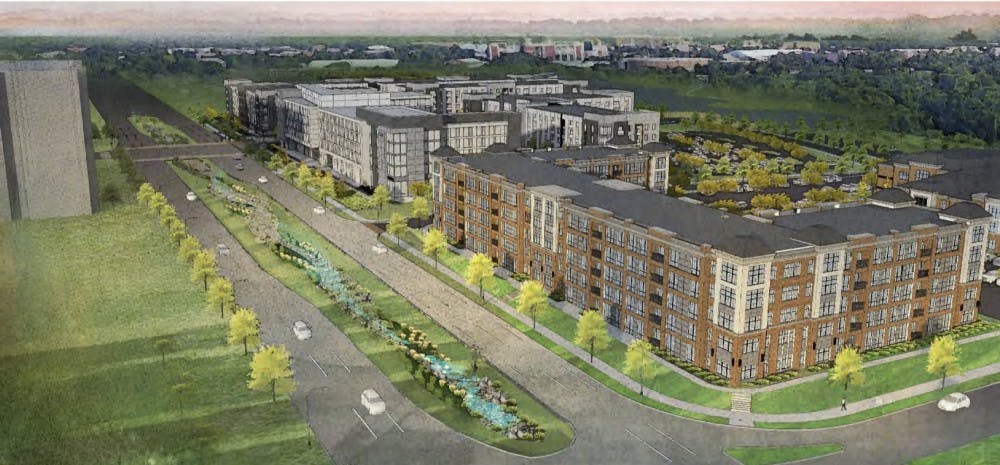A $200 million "global village" on the site of a former golf course along the Red Cedar River appears to be a go after it received approval from the Lansing Brownfield Redevelopment Authority.
The development's real estate and purchase agreement signed in 2018 includes plans for a boardwalk, housing, hotels, a restaurant with a view of the river and a pedestrian walkway connecting the property to Michigan State, according to a press release.
The city's approval of the plan, in development for more than six years, will allow MSU Trustee Joel Ferguson and Frank Kass — business partners of Lansing-based Continental/Ferguson LLC — to move forward with the project.
“I am excited that we are taking the next step toward making this development a reality,” Lansing Mayor Andy Schor said in a statement.
The project is planned for the former Red Cedar Golf Course on Michigan Avenue, right against the border between the two cities. It's across the street from the SkyVue apartment complex, another major development project completed in August 2017.
The proposed location is one of the project's biggest strengths, said Christopher Stralkowski, executive project manager for Ferguson Development.
“If you think of Lansing and East Lansing being one unit, it’s dead center,” he said.
Stralkowski and Ferguson said the Red Cedar project is a massive step forward for regional development.
“I’m so proud to be part of a project that will be a game-changer for Lansing, the Michigan Avenue corridor and the region,” Ferguson said in a statement.
The project site lies on a designated flood plain. More than one-quarter of the project's budget is allotted for infrastructure improvements to prevent flooding, with an estimated cost of $54 million.
“Water seeks its own level,” Stralkowski said. “In a nutshell, that’s been the biggest challenge.”
Stralkowski said the foundations will be built seven feet above the flood line, as no permanent construction can survive being built below that level.
He said the Ingham County Drain Commissioner's office is creating waterfalls and ponds that will extend throughout the whole drain district which includes the new development, as well as the Frandor Shopping Center, part of Saginaw Street and Clippert Street. The drain district updates are funded through taxes.
Stralkowski said project plans also include a process of "compensating cuts," meaning each square foot of dirt replaced by concrete would be compensated for elsewhere along the Red Cedar River watershed.
“Water is a feature, but it’s also a challenge for design and engineering,” he said.
Stralkowski said infrastructure expenses typically make up 10 to 15 percent of the overall cost, while infrastructure costs for the Red Cedar project make up about 25 percent.
“We’re looking for that sweet spot in terms of how much you can invest above to pay for what’s below,” he said.
The investors will recoup some costs of developing the land through tax increment financing, or TIF, subsidies.
Property values for brownfields — contaminated or unused sites of former development — are lower than other development sites. TIFs can encourage investment in brownfield plans, as developers are reimbursed from the increase in property taxes as the value of the property rises due to the new construction.
The Lansing Brownfield Authority will also issue public bonds to fund the project, Lansing Economic Area Partnership President Bob Trezise said in a statement.
Support student media!
Please consider donating to The State News and help fund the future of journalism.
The brownfield plan was presented at the Feb. 25 Lansing City Council meeting. The council unanimously approved the development and purchase agreement for the project in July 2018.
In addition to the council and brownfield authority's approval, the project still needs the Department of Environmental Quality and the Department of Natural Resources to sign off, Stralkowski said. The Department of Environmental Quality must re-approve the project based on changes to the development plan.
Plans are expected to be approved by all parties by early summer, with construction expected to begin in September.
“Lansing’s time is now,” Stralkowski said. "I don’t think we need a mall; those days are over.”
Editor's note: This article was updated at 12:40 p.m. to clarify the drainage updates will happen throughout the drain district, not just at the new development location.
Discussion
Share and discuss “$200 million 'global village' on Lansing-E.L. border now underway” on social media.








